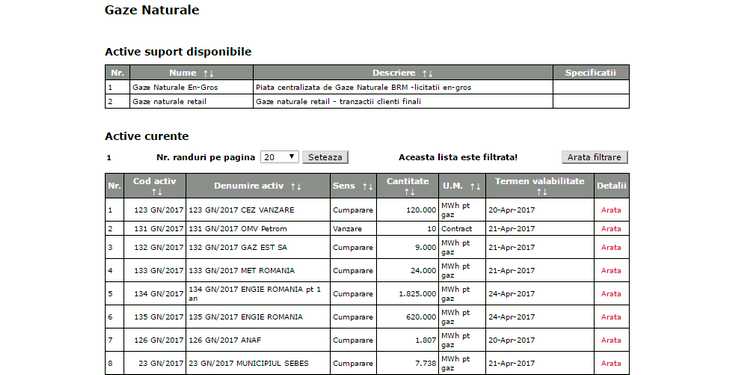The Romanian Commodities Exchange (BRM) could be eliminated as a trading market, in the advantage of OPCOM, it is shown in a press release of BRM, submitted to energynomics.ro.
“BRM took note with surprise and dismay of some proposals for the completion of the Law no.123/2012 in the Draft Law for the approval of the Government Emergency Ordinance no.64/2016, proposals that are likely to have a dangerous, unfair and unjustifiable impact on the institutional existing and functioning structure of the national gas market”.
“Among other things, it is about imposing a single license for a centralized market operator, both on the wholesale and on the retail markets. We do not want to make no accusations, but it is easy to guess that, if these amendments would pass into law, which is the organization most likely to become the holder of the respective license”, it is shown in the release submitted to energynomics.ro, suggesting the present electricity market operator OPCOM would be the receiver.
The officials of the Romanian Commodities Exchange state that ” in any developed and democratic country, the market operator activity is not an administrative activity exercised by an administration or by a company directly or indirectly owned by the state”.
On the contrary, this is “a commercial activity offered and freely performed by economic agents with an interest and an expertise in the field, without any limitations of their access (obviously with the fulfillment of certain licensing conditions). In this way, not only the fundamental right of free initiative is ensured, but also the efficiency by means of competition, as well as a reduction in the operating price, and also elimination of any suspicion that a political or an intereted group might interfere in the sensitive field of price formation and granting the agreements. This is all the more important in a strategic and vital area of public interest, such as the energy sector”.
“The legislative change that could, probably, exclude from the game BRM, the privately centralized market with the best results and most ambitious projects (eg: central counterparty provided by a regional leader, alternative trading license system for derivative agreements for natural gas) is included in a draft of an Emergency Ordinance which does not contain any provision regarding the status of the market operators. This piece of legislation was concerned with the liberalization of the market and not with its closure in terms of the infrastructure support services”, also states the release.
The Romanian Commodities Exchange is the only institution in Romania that currently detains a centralized natural gas market license, a commodity exchange license as well as a capital market intermediary license and is in the process of obtaining an MTF market license for trading financial instruments with commodity support (mainly in the energy field).
Unique centralized market operator license
On the one hand, a resolution of the EU Parliament is invoked, which would plead for a single national market operator in each Member State, because that operator should be the sole administrator of the virtual trading point (which is also introduced and defined, on this occasion, in the project), also said the BRM officials.
“It should be noted, however, that a specific provision is not identifiable as such in the resolution. The resolution itself is a collection of generic recommendations and positioning, which has, as its main target, the communitary policies and authorities, and not so much the legislative policy of the national states. However, it does not, at any rate, have any normative value and should not be implemented”, argue the BRM officials.
The BRM representatives note that the example of Austria is invoked in the field of centralized gas market operators, while Austria was not taken as an example in establishing the market model in the field of electricity.
“Obviously, we can discuss on the evolution of the gas and electricity markets in other European countries, which contradict this example and where several market operators have been operating simultaneously (or have not been banned from doing so). However, trying to impose a single market operator becomes only a counter-productive exercise to stifle the national competition, since the EU licensed foreign operators can enter the market with no restrictions, if they really want to do it, based on the European passport of free movement of services”, mentions the quoted source.

